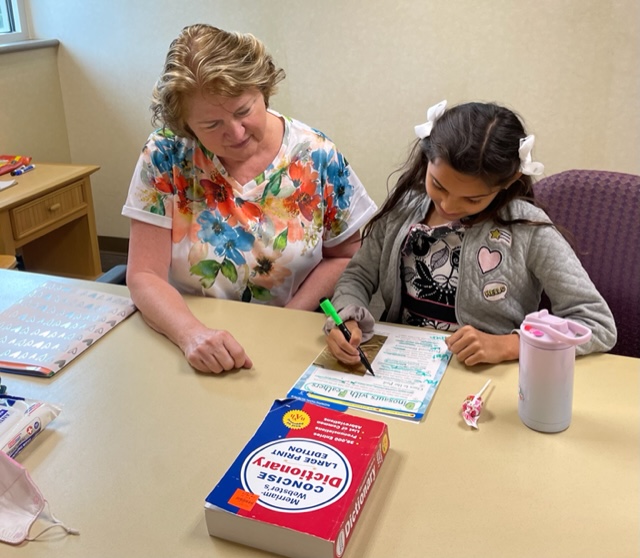
Palmetto Literacy Council Uses Core Values to TEACH the Three R’s
The Palmetto Literacy Council is dedicated, with a passion, to helping both children and adults acquire the literacy skills they require to succeed in school and in life. With the help of volunteer tutors and just a couple of hours a week, this organization is ensuring that all who need help to get up to scratch on their reading, writing, language skills, and math, are getting that help, and it’s all free of charge. Does the Palmetto Literacy Council sound like a nonprofit with heart? We thought so, and that’s why we wanted to get behind this important initiative by way of our small grant program.
We spoke with Palmetto Literacy Council Founder and Executive Director Dodi Hodges to learn more about this work:
Kars4Kids: Can you tell us something about the demographic you work with? Are many of those you work with struggling with reading, writing, and math?
Dodi Hodges: We know that 51% of our students in Horry County Schools cannot read at grade level and 57% cannot do math at grade level. Approximately 12% of the adults in our county are functionally illiterate.
Kars4Kids: The Palmetto Literacy Council tutors are volunteers. How many volunteers do you have? Are they mostly retired seniors? What kind of training do they undergo?
Dodi Hodges: We have over 50 volunteers doing various things to help the organization and about 34 volunteer tutors. Yes, they are mostly retired seniors. All volunteers attend volunteer orientation and training. We briefly go over the reading and math curriculum during training along with strength-based language training, etc. Once a volunteer is paired with a student, they get an additional training session (and help as needed) going over the specific materials they will use for the student. Our students get an individualized program using specific strategies and tools to meet their needs.
Kars4Kids: How many children are currently benefiting from your tutoring services? How many adults?
Dodi Hodges: In 2021, we paired 62 students with tutors. We have about 35 students being tutored currently. We have 9 adults currently being tutored, or about 25%.
Kars4Kids: Does literacy in reading and writing tend to be on a par with math skills? How many of your students need tutoring in all three subjects?
Dodi Hodges: We tutor more students in reading and writing than in math. Math is a definite need in this community. Our reading program is a reading and writing program. However, depending on the student’s needs, we also supplement with a phonics program, a penmanship practice program, or a grammar program as necessary. The individual needs of each student is our foundation.
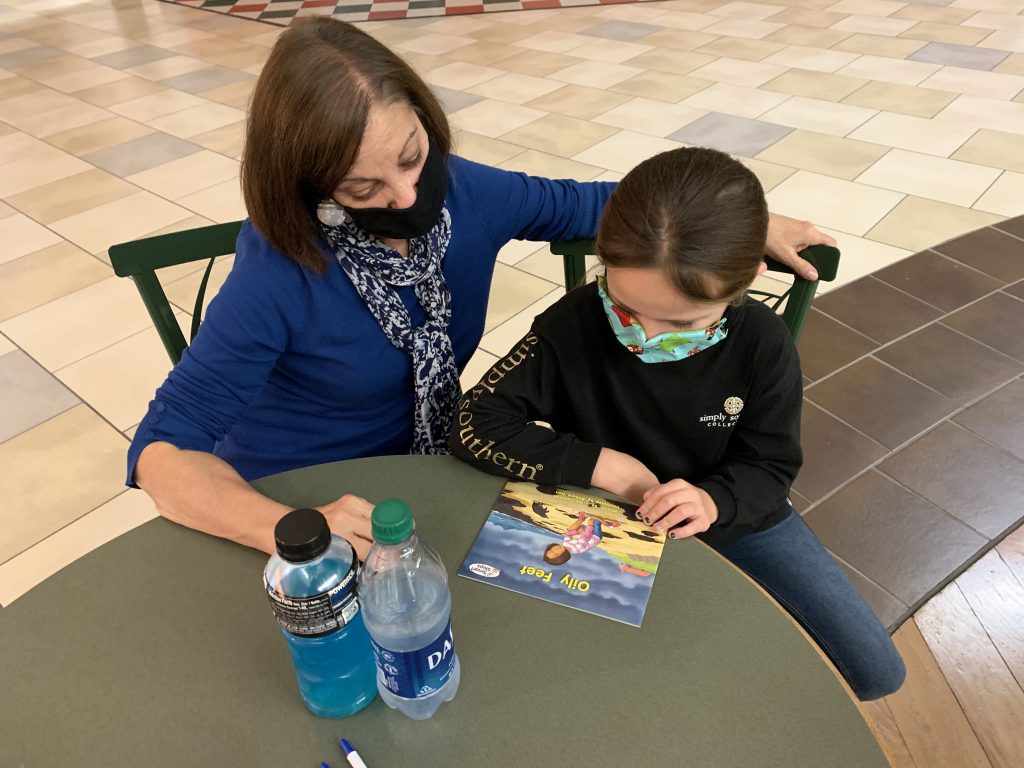
Kars4Kids: The work of the Palmetto Literacy Council is guided by the acronym “TEACH.” Can you talk about what that means for staff and volunteers?
Dodi Hodges: This is discussed frequently with our staff and volunteers. With a strong set of values that we all share; we help our students thrive. It starts with a core set of values.
TRUST – With every relationship we build, we are cognizant of the importance of the foundation of trust. This value is important and our first value as our foundation.
EXCELLENCE – We strive to provide excellence in everything we do: tutoring, programs for tutoring, matching our volunteers to jobs they want and can do for us, and completing administrative duties in such a way as to provide best service.
ACCOUNTABILITY – We are in this together and we strive to help everyone do their job. In every organization if we strive to do our best, it makes everyone’s job easier. Therefore, we are accountable for our duties and our actions.
COLLABORATION – Everything we do at Palmetto Literacy Council requires some level of collaboration. We have worked hard to find partners (volunteers and organizations) who will work with us to provide the best teaching/tutoring in the area.
HONESTY & INTEGRITY – We finish with two (2) other foundational values, honesty and integrity. We value the input and feedback we get and want to improve. That can only happen if we are honest and use our integrity to communicate with each other as well as work with each other.
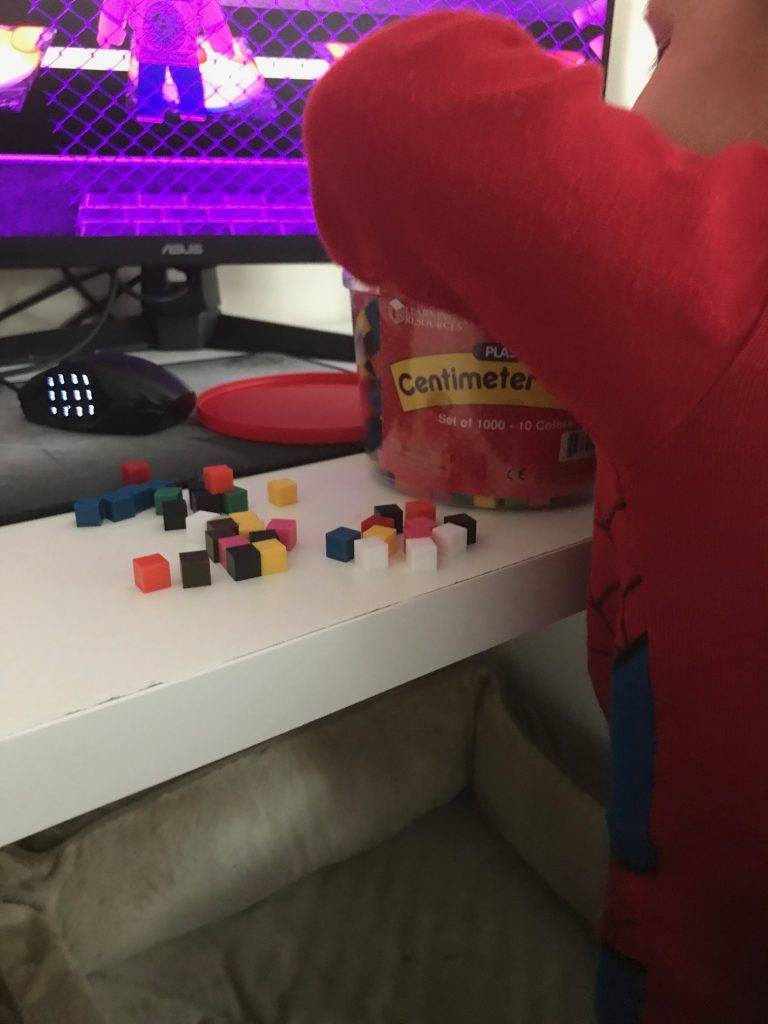
Kars4Kids: Are your tutors using any specific pedagogical methods in their work with students?
Dodi Hodges: We use strength-based language to begin our shared pedagogical methods. This means we make sure that we are speaking to the students in a way that encourages and motivates them to learn by building on their strengths and skills. We recognize that the students have struggles, we focus on what they know and what they need to do next to improve.
Then we incorporate the Five Big Ideas of Reading (phonemic awareness, phonics, frequency (with prosody), vocabulary (which impacts comprehension more than the first three), and comprehension. They have to be able to write complete sentences to respond to comprehension questions. We use graphic organizers to help students “map” the information, store the information, and retrieve the information in their brains. Most of our students struggle with storing and retrieving information to put it on paper. We help with that.
Kars4Kids: Participants in your program get two free hours of tutoring a week, and volunteers commit to two hours a week, as well. Does two hours represent some kind of magic number for productivity? Or is it all the time that there is in relation to the large number of people you help each week?
Dodi Hodges: No, it’s not a magic number. It seems to be just enough to help students learn and commit to learning and it’s also just enough to get volunteers to commit. Less than 2 hours/week does not give us enough improvement in student learning. More than 2 hours each week and we lose the students and volunteers to other commitments.
Kars4Kids: We’d love to hear a success story, if you have one you can share.
Dodi Hodges: I just gave a TEDx talk and used two of our students as examples:
ADRIANNA was in 6th Grade when she started getting tutored.
She was in a special education classroom for Language Arts (Reading and Writing) and not in the general education classroom. She was not doing well in school.
Her strengths included that she was highly motivated, & exceptionally organized.
I won’t go in to all of what we focused on in her tutoring or about the wonderful relationship she has with her tutor, Ms. Karen Haas.
What you need to know is that by Grade 7, she had improved so much that the local school educators working with her and her mom, decided it was time for her to go back in the general education classroom for Language Arts.
Adrianna was nervous about this change…in the beginning. Then Adrianna started to shine. She was getting some support in class and, in addition, in her tutoring sessions.
By 8th grade, this year, Adrianna is getting some support in the general education classroom. She’s getting A’s and B’s in all of her classes. She’s still being tutored.
In January, her guidance counselor suggested and encouraged her to apply for the Early College program. Yes, that’s right.
She wasn’t sure if that was a good choice. I want you to hear that there was a little of that fear of failure creeping back in. We encouraged her to apply.
Well, she was accepted in the Early College program on the Wait List. She was not turned down!
She is also on our Board of Directors as a Student Representative.
Her initial goal, back in 2019, was to be a teacher — maybe, a few weeks ago she told her special education teacher, she was going to be a genetic counselor.
She knows she’ll have to take more science and math, as well as read – a lot!
That’s what tutoring can do for a student who is struggling. Her goals are more in line with her real hopes and her confidence is exponentially better.
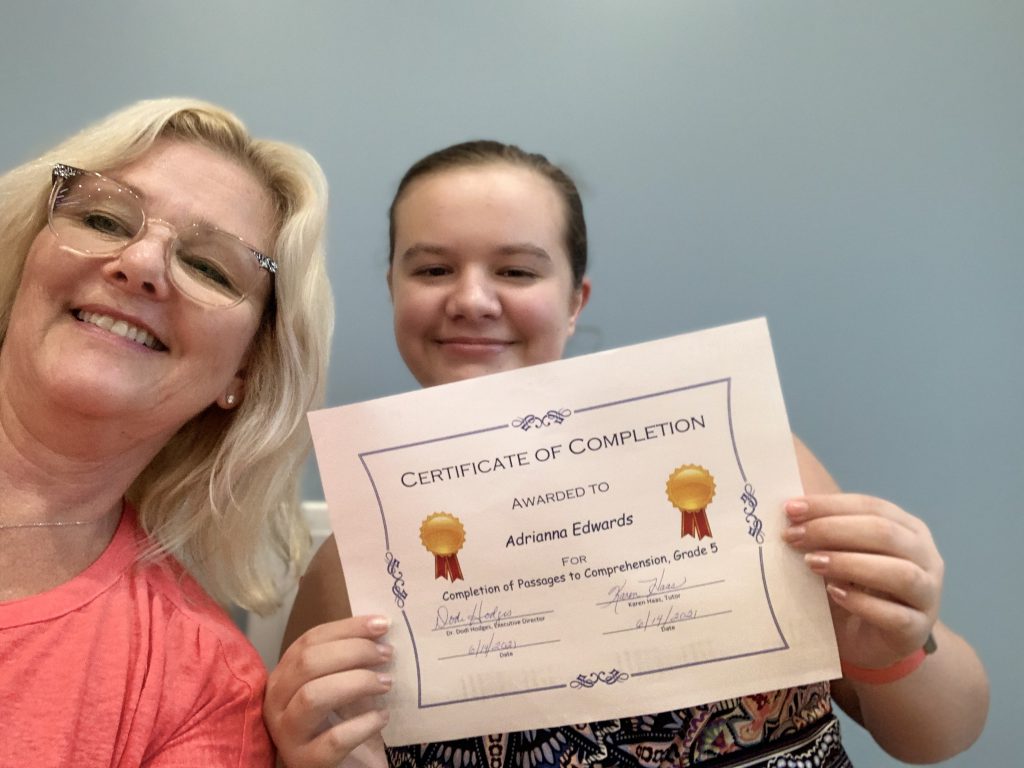
JOAN is from Jamaica and has lived in the U.S. for a long time. She is married and has children. She is a housekeeper and works for hotels/resorts in our area.
Joan struggled with employment, due to her inability to read English. Her bosses would text her with instructions on what she was supposed to do when she came into work.
Joan had her husband read the texts and then he would respond based on what she told him to write. It was not as quick as her employers wanted.
She reached out for tutoring, reading at the Grade 1 level. She was assigned a very compassionate and giving volunteer tutor, Ms. Phyllis Townsend.
After a few weeks of tutoring, COVID struck, tutoring halted, but Joan came back within weeks to continue tutoring. By now, she was unemployed.
After a few months, her progress was being assessed. She was so nervous. She wanted to show how much she had learned.
In a very excited voice, she said, “I need to show you something.”
First of all, she had gotten a new job at a different hotel, after several months of not having a job due to COVID. Her new boss was texting her about what she needed to do and when she was to work.
Suddenly Joan exclaimed, “Look! Look! Now I can read her texts, this is my boss. I don’t have to wait on my husband to read the text. I can also answer the text with a complete sentence. I use a capital letter at the beginning and a period at the end. Right, Ms. Phyllis?”
Imagine that kind of pride of accomplishment. Imagine how much better she is as an employee.
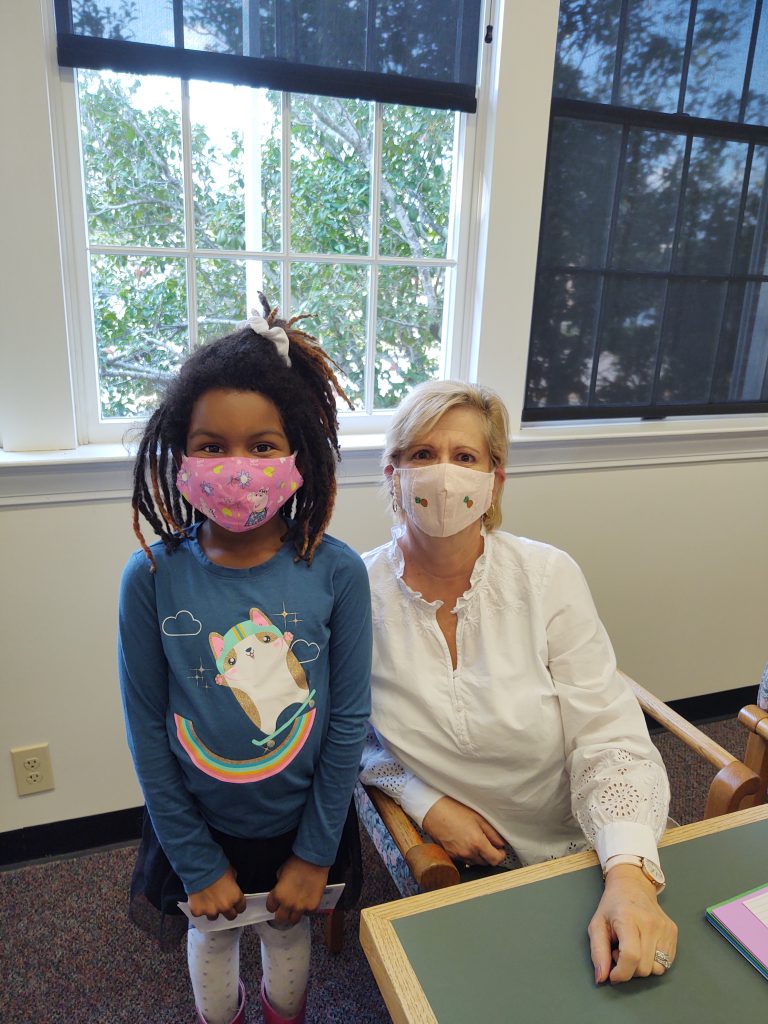
Kars4Kids: What are the causes of literacy issues among your participants? What effect does not having a good grasp of reading, writing, and/or math, have on a child? What is the effect on adults? Is there a correlation between cause and effect and why your tutoring services are offered free of charge?
Dodi Hodges: The causes of literacy issues among our participants? They vary. Some are ELL, some have a reading or math learning disabilities, some are experiencing the COVID slide, and some just need a little more help.
What is the origin of the problem?
I’ve always taught my students to look beyond the symptoms of a student failing and look at what was causing the issue.
Figure out why a student is struggling by asking
- what does the student know?
- how are they learning?
- what is missing? and
- what do they do well?
Then you can begin to teach them and build on their strengths.
Tutoring can provide strategies for students that they may not have been introduced to in school, or may not have practiced using with enough guidance.
For students and adults who struggle with reading, writing, and math, there are a myriad of issues.
Some students can read the words at grade level and at the same time cannot tell you who the characters are, what the setting, or really anything about what they read.
Some students and adults struggle with being able to sound out the words, put the sounds together to make the word, or figure out what a word means in a sentence.
These are just a few examples.
What we do know is that students who get some additional help using research-based learning strategies are far more successful in reading, writing, and/or math than those who don’t.
Learning strategies work for every student, those with and without learning disabilities. I mean every student.
There is no correlation between cause and effect and our offering free services. We offer free services because as the founder and executive director, I’ve had the opportunity to recruit volunteers who are just as passionate about reading, writing, and math as I am. Passion for learning drives this organization.
Kars4Kids: How did the pandemic affect your operations?
Dodi Hodges: Oh yes…grant funding dried up (it went to food and shelter as it should have), donations dried up, students and volunteers went on hold. After the 6 weeks of shut down we went from 22 students being tutored to 6: 3 online and 3 in person. We’ve had to rebuild. Then Delta, then Omicron…all of this impacted our volunteers’ willingness to tutor, which we totally understand.
Kars4Kids: What’s next for the Palmetto Literacy Council?
Dodi Hodges: Growing…getting at least 65 students to be tutored consistently by the end of the year…Our goal is 100. We want to see our students “graduate” from our services. I attend school meetings, like IEP, evaluation for Special Education services and parent-teacher conferences when invited by parents. I encourage parents to invite me if their child is going through the identification process or has an IEP.